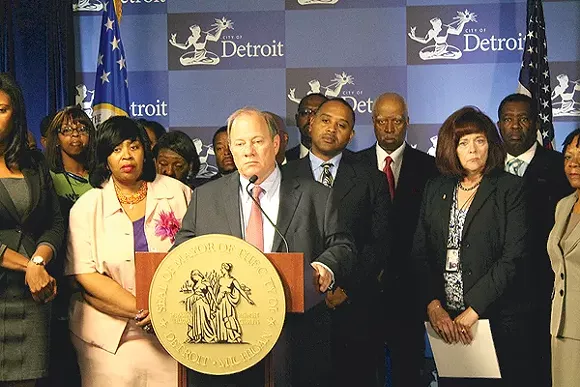
Ryan Felton/MT
Detroit Mayor Mike Duggan at a press conference in August 2014 unveiling a water bill payment plan.
With tens of thousands of Detroit residents on the cusp of losing their water service last year, Mayor Mike Duggan announced a payment plan he claimed would prevent a flood of shutoffs in the city.
The plan, introduced last August, worked like this: Residents in arrears could enter into a two-year plan by paying down 10 percent of their past-due balance. While paying the payment plan, the resident would have to continue covering their monthly bill, as well. If the resident missed a payment, they would then have to pay 30 percent of their balance to keep their water tap running; another missed payment, they'd have to pay 50 percent of the balance. A fourth missed payment? You're out of luck and your service would be disconnected.
By all accounts, the "10-30-50" plan hasn't worked. Curt Guyette, an investigative reporter for the American Civil Liberties Union of Michigan, reported Saturday that nearly all residential accounts set up with a payment plan are 60 days past due, which, by definition of the Detroit Water & Sewerage Department, means they're at risk for shut-offs. From Guyette:
According to the most recent numbers provided by Detroit’s Department of Water and Sewerage, 24,743 residential customers are enrolled in a payment plan. Of that number, 24,450 are at least 60 days past due on their payments—meaning that their homes are in danger of losing water service once the city resumes shutoffs.
Stated another way, only 300 of the 24,743 customers put on the mayor’s payment plan were able to keep up with their payments and ensure their water will keep flowing.
Maureen Taylor, chair of the Michigan Welfare Rights Organization, put it bluntly to Guyette, saying, “You didn’t need to be a rocket scientist to figure out what the outcome would be. If people are already unable to pay their bills, how could you expect them to keep up if you add past-due payments on top of that? The plan was fundamentally flawed from the beginning, and we said that.”
And even with the city's efforts, aided by water funds established in wake of Duggan's payment plan for low-income residents, more than 73,000 residential customers — or about 43 percent of Detroit's roughly 170,000 total residential customers — were "at least 60 days past due as of the end of February," Guyette noted. That accounts for about $47 million in past-due bills. When the city implemented its aggressive water shutoff campaign last year, it reported having more than $110 million in past-due bills.
Meanwhile, the Detroit Free Press also had a story on Sunday about water shutoffs being set to resume, however the newspaper didn't have the same numbers provided by the Detroit Water & Sewerage Department to Guyette. Still, it reiterated the fact that, by and large, the water payment plan hasn't fixed much of anything.
According to the Freep report, activists said they were told by city officials that 13,000 residential customers on payment plans had defaulted again late last year. Officials didn't dispute that number, the Freep reported.
To address the issue, Gary Brown, the city's chief operating officer, told Guyette a new plan will be rolled out this summer.
In conjunction with the implementation of the GLWA, Brown said the Duggan administration “will roll out a new plan” modeled directly after DTE's Low Income Self-Sufficiency Plan (LSP).
That plan, said Brown, “has been highly successful.”
“We are working with 30 different social service agencies to finalize the eligibility criteria for the new program, which will be very similar to DTE. That process should be completed in the next few weeks. These agencies also will serve as our partners, to which we can refer customers for additional resources and support for water bills or other needs. “
Brown said the new plan will be based on three components:
· Predictability: The city will help established a fixed monthly bill (based on average usage).
· Incentive to pay: By reducing their arrearage, the city will make monthly bill payment more manageable. Payment and assistance plans will take into account the account holder’s income level.
· Sustainability: Under this new plan, the city will have account managers to work directly with customers to provide ongoing support and to make referrals to our partner agencies.
Brown told Guyette the Detroit Water Fund will now cover up to 50 percent of a customer's arrearage and 25 percent of delinquent bills. A potential problem? There's only about $1.4 million left in that fund. Taking into consideration that DWSD still has $47 million in outstanding bills — well, the math doesn't really add up.
Activists, instead, continue to call for the implementation of a water payment plan based on one's income. Brown told Guyette that's not going to happen in Detroit. Check out the full report here.






